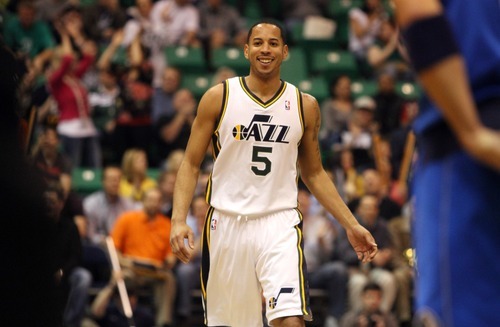This is an archived article that was published on sltrib.com in 2012, and information in the article may be outdated. It is provided only for personal research purposes and may not be reprinted.
The quote turned into a punchline.
After being traded to the Jazz in February 2011, Devin Harris said his first thought was "Playoffs, baby."
Not last season.
Utah continued to fall apart following the Deron Williams deal, and Harris finished last season fighting off injuries and the perception his game had become underwhelming.
This year started even worse. While the Jazz jumped out of the gate, announcing themselves as one of the surprise teams in the Western Conference, Harris never looked right. His rhythm was off, his shot clanked, he went back and forth with coach Tyrone Corbin, and many Utah fans harped on what was obvious: Devin Harris no longer played like Devin Harris.
Had the Jazz received a lemon for D-Will? No. Just an athletic, intelligent, proud point guard who needed a little extra time.
"It's kind of a rebirth," said Harris, following Utah's 112-91 blowout of the Portland Trail Blazers on Wednesday, during which he scored a game-high 27 points in 30 minutes and sank a career-high six 3-pointers.
"Any time you get a chance to go to a new team, you get a chance to reinvent yourself and build on that legacy," Harris said. "Obviously the Jazz have a great legacy in what they do and how they play and what kind of organization they are. I'm just glad to be a part of it."
Harris is finally part of something good again. Utah is just three wins away from returning to the playoffs; general manager Kevin O'Connor's risky gamble looks smarter with each 3 Harris buries; and the Jazz suddenly have a floor leader who can spread the court, beat opponents off the dribble and burn the net when given space.
The 29-year-old Harris acknowledged early-season criticism of his game, but said he's not firing away just to prove flamers wrong. He already has all the motivation he needs.
"I don't really think about [critics]," Harris said. "My goal was to get the team to the playoffs. That's what I talked about last year, and that's the only thing that I see right now."
He added: "It's right there. It's been five years since I've been in the playoffs. I'm hungry to get back."
Harris is averaging 16.5 points and 5.9 assists during 10 games in April, shooting 43.8 percent from the floor and 40 percent behind the 3-point line. He's drilled at least two 3s in six of the contests, and is a scorching 11 of 22 beyond the arc during Utah's past two games.
"He's been on fire recently. We really need him to keep shooting like that," Jazz forward Gordon Hayward said. "It just opens everything up for us and makes everything much easier for us."
Harris' resurgence has directly affected his body language and on-the-court confidence. His climb began when he started racing the ball up the court, beating lazy defenders for fast-break layups. It's been aided by deepening friendships with teammates, his comfort in Utah's locker room, and the realization the power to ignite the second era of his career rests in his hands.
"I just think that he's finding [himself] in this offense," Jazz center Al Jefferson said. "He didn't quite know how to put his game into this offense and now he doing it. It's dangerous."
So are the Jazz with a high-caliber, playoff-tested starting point guard.
Briefly • According to the NBA, the Jazz are one of only three teams in history to play a single-, double-, triple- and quadruple-overtime game during the same season. … Utah is expected to sign backup point guard Blake Ahearn for the remainder of the year. Ahearn's initial 10-day contract expired Thursday. He's averaging 1 point and 5 minutes in three games. Ahearn will be eligible for the playoffs if the Jazz make the postseason.
Twitter: @tribjazz
facebook.com/tribjazz —
Harris' improvement
Month Min FG 3pt FT Ast TO Pts
January 26.2 44.7 34.2 67.4 4.9 1.9 9.1
April 33 43.8 40 69.8 5.9 1.9 16.5



